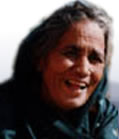 |
 |
||
 |
|||
|
RELATED THEMES development gender migration social change OTHER LOCAL THEMES BACKGROUND |
education
Many narrators had no opportunity to go to school, and the increased access to education for most of their children is probably one of the biggest differences in experience between generations. Some older narrators feel that this has led to young people having less respect for their parents and grandparents' generations. Certainly some men and women, whose expertise in their environments and livelihoods has been derived from accumulated experience and the passing down of traditional skills, express a sadness that such knowledge is no longer valued as much as "bookish" learning. Yet most parents are determined to educate their children, even though the cost can be a burden, as can distance and terrain. One man (India 8) describes the good facilities available for his community but warns: ". this is not so in other villages. Children have to travel up to 8 kms even to get primary education in many villages. There are some places where there is no bridge over the streams and the children have to face so many difficulties that the parents think it is better not to get their children admitted at all." Many stress how achieving some degree of literacy and numeracy protects villagers from being cheated: "An illiterate person is like an animal [and] can be duped, cheated. people cheat him by giving him expensive things and not weighing the goods properly. We, the uneducated have no knowledge of weights and are being cheated at every step. An illiterate labourer is never paid his full labour charges. On the contrary, he is treated shabbily. He is not conscious of his basic rights. It becomes very difficult for him to survive [with dignity]." (India 18) Although there are a few who still oppose the idea of girls going to school, more say how important female education is as a means to enhance women's position in society, and to get their voice heard. One woman says: "Educating girls is very essential. At times she may have to fight for her rights and on these occasions education is required. Today they are working because of their education and it has brought about a marked change in their general condition and status." Some may agree but if they can't afford to educate all their children, boys still come first: ".we do not have enough money to teach our daughters. It involves too much expenditure ... clothes, books, copies, pencil, pen, etc. Where do we get so much money from? We have put two children into school.There is no scope left to teach the girls." (India 23) Despite a general feeling that formal education is vital in today's world, some narrators question the appropriateness of the style and content. Some criticise the quality of actual teaching, but more comment on the need for traditional and vocational education alongside formal academic study. They are concerned that all too often education leads to migration away for work or further study, so that mountain communities are gaining little or no benefit from the new generation. quotes about education"The system - the entire educational structure needs to be revised. Along with the basics of education, training in our old professions should also be given. Because when a child gets higher education, say up to the degree or intermediate level, he or she is totally ignorant about his traditional profession like farming and cattle rearing." "I did not have the means to feed my children's stomachs and mine. So educating them was too far from my reach." "There are some children who are very understanding. They respect the old ways. It is not as if all of them are the same. Education does not make them completely different. In my opinion, an understanding girl will remain so, even if she becomes educated." "I feel that girls should not be educated.If they have to slog, cut grass, till the earth, then what use is education?" "[Some women] think. if the girls who are studying get jobs, it is all right.They don't have the slightest understanding that an educated person is an educated person even if the person stays at home. [They feel] if you have to cut grass, of what use was education?" "I am not educated but all the other family members are making good use of these schools. I am also attending classes run by the Literacy Mission and now I can write my name, and have learnt to count! I am happy that there are schools all over our place.It hurts me when I see that in spite of so many schools nearby, some people refuse to send children for education. Women must take the lead and put an end to illiteracy." "Today's children are educated, they have started going out, they have seen the world; they have started pointing out shortcomings in our work. We have spent our entire life in the village. We have neither seen anything nor are we well read. Children have now started working of their own free will." |
|